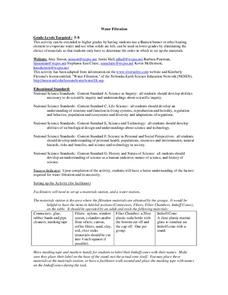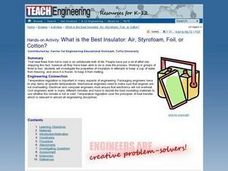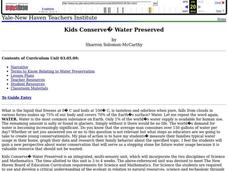Curated OER
Bird Brained?
Students identify general abilities that indicate animal cognitive intelligence. In this biology lesson, students create an intelligence testing challenge for ravens. They compare its ability to that of a crow.
Curated OER
Explore the Effects of Immigration
Learners explore the effects of immigration on the immigrants and on society as a whole. They will record the experiences of specific immigrant groups using an E-sheet. Groups present a summary of what they learned about their ethnic...
Curated OER
Basics of Archaeology
Young scholars identify what and how to complete an Archaeological excavation is conducted. They identify the transition from one layer to the next more easily if the colors of the layers are different. When creating a dig, the teacher...
Curated OER
Dogfighting Lesson Two - Bite Prevention and Community
Young scholars discover how to prevent dog bites by completing worksheets and watching a video. In this animal safety lesson, students view a video called Dogs, Cats and Big Kids, taking notes throughout. Young scholars take a quiz and...
Curated OER
Water Filtration
Students investigate our water system and how it is filtered. In this science instructional activity, students perform a laboratory activity to investigate the process that goes into filtering water. They relate this activity to other...
Curated OER
The Dirt on Worms!
Fourth graders make predictions, observe, collect and record data. They investigate several soil and worm websites. Finally, 4th graders write a letter to The President which defends earthworms by explaining their value to the United...
Curated OER
Lakes and Ponds
Students describe and recognize the difference between a lake and a pond. They name six ways in which a lake or pond can be formed. They describe the importance and act of evaporation on a waterway.
Curated OER
What is the Best Insulator: Air, Styrofoam, Foil, or Cotton?
Students investigate the properties of insulators by attempting to keep a cup of water from freezing, and once it is frozen, to keep it from melting. They conduct the experiment, record and analyze the results, and answer discussion...
Curated OER
Kids Conserve? Water Preserved
Sixth graders review the steps of the water cycle. Individually, they calculate the amount of water they use in a day and identify ways they can conserve. As a class, they discuss how conserving water today helps future generations and...
Curated OER
Kids Conserve? Water Preserved
Young scholars study conservation and how cities obtain their water. In this water instructional activity students view a PowerPoint presentation and draw a picture of the water cycle.
Curated OER
Memory and Legacy: Building Monuments and Memorials
Students analyze the reasons why groups build monuments and memorials. Using the Holocaust as an example, they reflect on issues that are addressed in monuments related to it. They create a monument of their own and write an essay about...
Curated OER
Charting Identity: Building Community in the Classroom
Students define identity as it applies to them and their classmates. Using real-life situations, they discuss how identity plays a role in their school and community. They practice creating identity charts and write journal entries to...
Curated OER
A Poster is Worth a Thousand Words
Students list observations of PSA posters. They provide evidence/examples of their observations through class discussion. Students explore public health posters. They investigate historical public health campaign posters.
Curated OER
Heredity, Genetics, Traits
Eighth graders study how an embryo develops into a fetus by undergoing many physical changes which they observe on a poster. They examine the metamorphosis of fruit flies as they develop through a series of changes. They record the...
Curated OER
Clay Hill Animal Sampling
Young scholars create animal print casts from molds in the classroom. They use the cast patterns to identify animal prints on a field trip in which they locate animal tracks, identify the location with GPS and create field casts of the...
Curated OER
A Look At Sunspots
Young scholars research how the development of new technology has increased our knowledge of how the sun works. This lesson is part of a three-part series aimed at showing students how our knowledge of the universe must be inferred...
Curated OER
Diversity And Adaptations Of Organisms
Seventh graders demonstrate the processes of science by posing questions and investigating phenomena through language, methods and instruments of science. They study the body features or systems of several animals.
Curated OER
It Bears Repeating!!!
Students research bears and their characteristics with a specific study on North American bears and polar bears. In this bear study lesson, students read books about polar bears and wild bears. Students complete activities to further...
Curated OER
"Hard" Data from Space
Students use satellite images to analyze development patterns within Baltimore City. They prepare a land cover map for Baltimore indicating the prevalence of impervious surfaces and explore how these patterns affect water pollution.
Curated OER
Lake and Pond Study
Students examine the habitat and community structure of a pond that could support Ospreys through games and worksheets. They then go on a field trip to a pond to evaluate the suitability of the pond as an Osprey habitat.
Curated OER
Frog Metamorphosis
Students play 20 Questions with animal characteristics and then view an animation of how a tadpole changes into a frog. They consider the importance of camouflage to frogs and write out the story of a frog from tadpole to adult.
Curated OER
Microbes: Too Smart for Antibiotics?
Students examine how germs spread from one person or object to another. They discuss antibiotic resistant bacteris and examine the benefits of microorganisms. They explore methods of curbing antibiotic resistance.
Curated OER
The Five Senses
Students use their senses to identify a variety of items in mystery boxes after listening to a read aloud of Aliki's, "My Five Senses." They taste and smell items to identify them before completing a Senses Literature Log. They label the...
Curated OER
Tread Lightly: Where We Stand
Students explore the concept of ecological footprints. In this environmental stewardship lesson, students calculate their ecological footprints and consider how to reduce them.

























